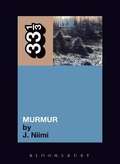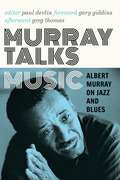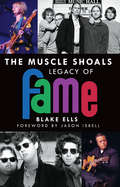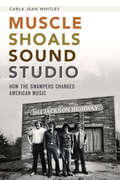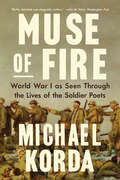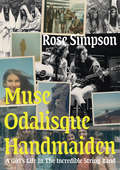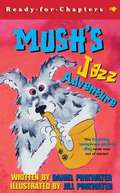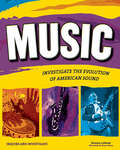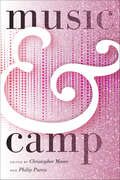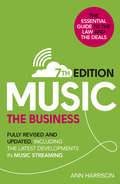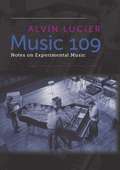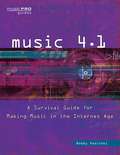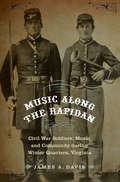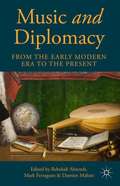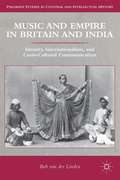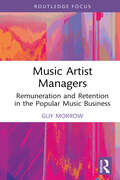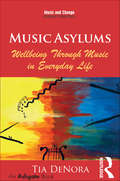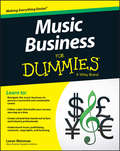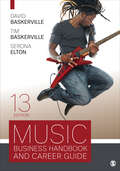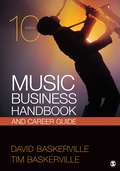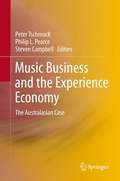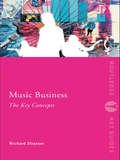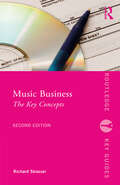- Table View
- List View
Murmur (33 1/3 Ser. #22)
by J. NiimiR.E.M.'s debut album, released in 1983, was so far removed from the prevailing trends of American popular music that it still sounds miraculous and out of time today. J. Niimi tells the story of the album's genesis - with fascinating input from Don Dixon and Mitch Easter. He also investigates Michael Stipe's hypnotic, mysterious lyrics, and makes the case for Murmur as a work of Southern Gothic art.
Murray Talks Music: Albert Murray on Jazz and Blues
by Albert MurrayThe year 2016 will mark the centennial of the birth of Albert Murray (1916–2013), who in thirteen books was by turns a lyrical novelist, a keen and iconoclastic social critic, and a formidable interpreter of jazz and blues. Not only did his prizewinning study Stomping the Blues (1976) influence musicians far and wide, it was also a foundational text for Jazz at Lincoln Center, which he cofounded with Wynton Marsalis and others in 1987. Murray Talks Music brings together, for the first time, many of Murray&’s finest interviews and essays on music—most never before published—as well as rare liner notes and prefaces.For those new to Murray, this book will be a perfect introduction, and those familiar with his work—even scholars—will be surprised, dazzled, and delighted. Highlights include Dizzy Gillespie&’s richly substantive 1985 conversation; an in-depth 1994 dialogue on jazz and culture between Murray and Wynton Marsalis; and a long 1989 discussion on Duke Ellington between Murray, Stanley Crouch, and Loren Schoenberg. Also interviewed by Murray are producer and impresario John Hammond and singer and bandleader Billy Eckstine. All of thse conversations were previously lost to history. A celebrated educator and raconteur, Murray engages with a variety of scholars and journalists while making insightful connections among music, literature, and other art forms—all with ample humor and from unforeseen angles.Leading Murray scholar Paul Devlin contextualizes the essays and interviews in an extensive introduction, which doubles as a major commentary on Murray&’s life and work. The volume also presents sixteen never-before-seen photographs of jazz greats taken by Murray.No jazz collection will be complete without Murray Talks Music, which includes a foreword by Gary Giddins and an afterword by Greg Thomas.
Muscle Shoals Legacy of FAME, The
by Blake Ells Jason IsbellFAME Publishing first opened in 1959 and produced hits for great musicians like Etta James, Clarence Carter and Aretha Franklin. Not long after, the city of Muscle Shoals became known as the "Hit Recording Capital of the World." FAME was the foundation that produced Muscle Shoals Sound Studio, the Nutthouse and Sundrop Sound at Single Lock Records--studios that gave a voice to artists like Drive-By Truckers, Jason Isbell and the 400 Unit and John Paul White. A new generation, including the Pollies and Doc Dailey & the Magnolia Devil, today carries the tradition of great music. Through extensive research, and enriched with interviews from those who lived it, local author Blake Ells chronicles the epic story that started with FAME.
Muscle Shoals Sound Studio: How the Swampers Changed American Music (Music Ser.)
by Carla Jean WhitleyThe chronicle of the legendary Alabama studio brings to life decades of rock, blues, and R&B history from The Rolling Stones to The Black Keys. An estimated four hundred gold records have been recorded in the Muscle Shoals area. Many of those are thanks to Muscle Shoals Sound Studio and the session musicians known as the Muscle Shoals Rhythm Section—also dubbed &“the Swampers.&” Some of the greatest names in rock, R&B and blues laid tracks in the original, iconic concrete-block building, including Cher, Lynyrd Skynyrd, and scores of others. The National Register of Historic Places now recognizes that building, where Lynyrd Skynyrd recorded the original version of &“Free Bird&” and the Rolling Stones wrote &“Brown Sugar&” and &“Wild Horses.&” By combing through decades of articles and music reviews related to Muscle Shoals Sound, music writer Carla Jean Whitley reconstructs the fascinating history of how the Alabama studio created a sound that reverberates across generations.
Muse of Fire: World War I as Seen Through the Lives of the Soldier Poets
by Michael KordaThe First World War comes to harrowing life through the intertwined lives of the soldier poets in Michael Korda’s epic Muse of Fire. Michael Korda, the best-selling author of Hero and Alone, tells the story of the First World War not in any conventional way but through the intertwined lives of the soldier poets who came to describe it best, and indeed to symbolize the war’s tragic arc and lethal fury. His epic narrative begins with Rupert Brooke, “the handsomest young man in England” and perhaps its most famous young poet in the halcyon days of the Edwardian Age, and ends five years later with Wilfred Owen, killed in action at twenty-five, only one week before the armistice. With bitter irony, Owen’s mother received the telegram informing her of his death on November 11, just as church bells tolled to celebrate the war’s end. Korda’s dramatic account, which includes anecdotes from his own family history, not only brings to life the soldier poets but paints an unforgettable picture of life and death in the trenches, and the sacrifice of an entire generation. His cast of characters includes the young American poet Alan Seeger, who was killed in action as a private in the French Foreign Legion; Isaac Rosenberg, whose parents had fled czarist anti-Semitic persecution and who was killed in action at the age of twenty-eight before his fame as a poet and a painter was recognized; Robert Graves and Siegfried Sassoon, whose friendship and friendly rivalry endured through long, complicated private lives; and, finally, Owen, whose fame came only posthumously and whose poetry remains some of the most savage and heartbreaking to emerge from the cataclysmic war. As Korda demonstrates, the poets of the First World War were soldiers, heroes, martyrs, victims, their lives and loves endlessly fascinating—that of Rupert Brooke alone reads like a novel, with his journey to Polynesia in pursuit of a life like Gauguin’s and some of his finest poetry written only a year before his tragic death. Muse of Fire is at once a portrait of their lives and a narrative of a civilization destroying itself, among the rubble, shadows, and the unresolved problems of which we still live, from the revival of brutal trench warfare in Ukraine and in the Middle East.
Muse, Odalisque, Handmaiden: A Girl’s Life in the Incredible String Band
by Rose SimpsonA memoir by a member of the Incredible String Band that charts a journey from hippie utopia to post-Woodstock implosion.Between 1967 and 1971 Rose Simpson lived with the Incredible String Band (Mike Heron, Robin Williamson and Licorice McKechnie), morphing from English student to West Coast hippie and, finally, bassist in leathers. The band's image adorned psychedelic posters and its music was the theme song for an alternative lifestyle. Rose and partner Mike Heron believed in, and lived, a naive vision of utopia in Scotland. But they were also a band on tour, enjoying the thrills of that life. They were at the center of "Swinging London" and at the Chelsea Hotel with Andy Warhol's superstars. They shared stages with rock idols and played at Woodstock in 1969. Rose and fellow ISB member Licorice were hippie pin-ups, while Heron and Robin Williamson the seers and prophets of a new world.
Mush's Jazz Adventure
by Daniel PinkwaterNow that Mush -- the talking, cooking, educated dog from space -- is part of the Mangiaro household, Kelly wants to know more about the planet Growf-Woof-Woof, and how her dog came to Earth. When the two of them go on a picnic, (which Kelly prepares carefully under Mush's supervision), Kelly asks Mush about her past. "Well, it's such a long story," says Mush. . . and soon, Kelly is hearing about Mush's old jazz band, The Hot Animals, and how they dealt with robbers who threatened to knock over their boss's jive joint!
Music
by Donna Latham Bryan StoneThe United States boasts a rich musical diversity. Colonial Americans integrated European traditions with new cultural influences to compose a unique musical identity. African traditions influenced hymns and folk songs that connected people to religion and to the trials and tribulations of everyday life. Patriotic tunes created unity in wartime. America's jazz, blues, rock, and hip-hop continue to evolve from their African-American origins. Music: Investigate the Evolution of American Sound invites kids ages 12 and up to explore the roots of American music genres as they investigate the social, political, and religious influences that inspire musicians. Activities encourage readers to inquire into the art and science of music. Readers can engage in a hands-on exploration of the physics of sound vibrations, decibel levels, and acoustics, or use vocal styling to improvise and discover the rhythm of their bodies to create a beatbox. Music encourages readers to analyze lyrics, their meanings, and rhythms, and then use that analysis to write their own songs. This title meets common core state standards in language arts for reading informational text and literary nonfiction and is aligned with Next Generation Science Standards. Guided Reading Levels and Lexile measurements indicate grade level and text complexity.
Music & Camp (Music/culture Ser.)
by Christopher Moore and Philip PurvisThis collection of essays provides the first in-depth examination of camp as it relates to a wide variety of twentieth and twenty-first century music and musical performances. Located at the convergence of popular and queer musicology, the book provides new research into camp's presence, techniques, discourses, and potential meanings across a broad spectrum of musical genres, including: musical theatre, classical music, film music, opera, instrumental music, the Broadway musical, rock, pop, hip-hop, and Christmas carols. This significant contribution to the field of camp studies investigates why and how music has served as an expressive and political vehicle for both the aesthetic characteristics and the receptive modes that have been associated with camp throughout twentieth and twenty-first-century culture.Hardcover is un-jacketed.
Music (7th edition): Fully Revised and Updated, including the latest developments in music streaming
by Ann HarrisonThis essential and highly acclaimed guide, now updated and revised in its seventh edition, explains the business of the British music industry. Drawing on her extensive experience as a media lawyer, Ann Harrison offers a unique, expert opinion on the deals, the contracts and the business as a whole. She examines in detail the changing face of the music industry and provides absorbing and up-to-date case studies. Whether you’re a recording artist, songwriter, music business manager, industry executive, publisher, journalist, media student, accountant or lawyer, this practical and comprehensive guide is indispensable reading. Fully revised and updated. Includes: · The current types of record and publishing deals, and what you can expect to see in the contracts· A guide to making a record, manufacture, distribution, branding, marketing, merchandising, sponsorship, band arrangements and touring · The most up-to-date information on music streaming, digital downloads, online marketing and piracy· An in-depth look at copyright law and related rights· Case studies illustrating key developments and legal jargon explained.
Music 109: Notes on Experimental Music
by Alvin Lucier Robert AshleyComposer and peformer Alvin Lucier brings clarity to the world of experimental music as he takes the reader through more than a hundred groundbreaking musical works, including those of Robert Ashley, John Cage, Charles Ives, Morton Feldman, Philip Glass, Pauline Oliveros, Steve Reich, Christian Wolff, and La Monte Young. Lucier explains in detail how each piece is made, unlocking secrets of the composers' style and technique. The book as a whole charts the progress of American experimental music from the 1950s to the present, covering such topics as indeterminacy, electronics, and minimalism, as well as radical innovations in music for the piano, string quartet, and opera. Clear, approachable and lively, Music 109 is Lucier's indispensable guide to late 20th-century composition. No previous musical knowledge is required, and all readers are welcome.
Music 4. 1: A Survival Guide for Making Music in the Internet Age
by Bobby OwsinskiToday's music industry is constantly changing at a dizzying pace, and this book is fully equipped to help you navigate it. Written for artists overwhelmed by the seemingly endless options of the quickly evolving Internet, this is the only book that offers a comprehensive strategy for online success. In this book, the author includes an in-depth look at the economics of streaming music, with the real information about royalties that distributors and record labels don't want you to know and that simply can't be found anywhere else. The book also looks at how revenue is generated from YouTube and other video streaming services, and it provides techniques for optimizing both videos and channels for maximum success. Also included are lists of effective tips (both high- and low-tech) and checklists with every chapter, as well as a reference list of online tools for inexpensive music and merchandise distribution, sales, marketing, and promotion. With fresh interviews from several of today's successful music industry innovators, The book reveals new and proven pathways to success in the new paradigm of the modern music world.
Music Along the Rapidan: Civil War Soldiers, Music, and Community during Winter Quarters, Virginia
by James A. DavisIn December 1863, Civil War soldiers took refuge from the dismal conditions of war and weather. They made their winter quarters in the Piedmont region of central Virginia: the Union’s Army of the Potomac in Culpeper County and the Confederacy’s Army of Northern Virginia in neighboring Orange County. For the next six months the opposing soldiers eyed each other warily across the Rapidan River. In Music Along the Rapidan James A. Davis examines the role of music in defining the social communities that emerged during this winter encampment. Music was an essential part of each soldier’s personal identity, and Davis considers how music became a means of controlling the acoustic and social cacophony of war that surrounded every soldier nearby. Music also became a touchstone for colliding communities during the encampment—the communities of enlisted men and officers or Northerners and Southerners on the one hand and the shared communities occupied by both soldier and civilian on the other. The music enabled them to define their relationships and their environment, emotionally, socially, and audibly.
Music And Diplomacy From The Early Modern Era To The Present
by Rebekah Ahrendt Mark Ferraguto Damien MahietHow does music shape the exercise of diplomacy, the pursuit of power, and the conduct of international relations? Drawing together international scholars with backgrounds in musicology, ethnomusicology, political science, cultural history, and communication, this volume interweaves historical, theoretical, and practical perspectives.
Music And Empire In Britain And India
by Bob Van Der LindenMusic has been neglected by imperial historians, but this book shows that music is an essential aspect of identity formation and cross-cultural exchange. It explores the ways in which rational, moral, and aesthetic motives underlying the institutionalization of "classical" music converged and diverged in Britain and India from 1880-1940.
Music Artist Managers: Remuneration and Retention in the Popular Music Business (Routledge Focus on the Global Creative Economy)
by Guy MorrowTo what extent is it possible to do good work in music artist management? Drawing upon original research, this shortform book explores and evaluates motivation, remuneration and equity stakes within the music industries.The author ponders the apparent managerial exodus from the music industries and whether this brain drain could be addressed by providing better remuneration via equity. Based on evidence from Australia, the book illuminates how pay in this sector has remained flat despite increasing responsibility.Emphasising the quality of the subjective experience of music artist managers, this concise book provides readers with new insights into the important role managers play in the music business. The result is a book that will be useful reading for academics and reflective practitioners.
Music Asylums: Wellbeing Through Music In Everyday Life (Music and Change: Ecological Perspectives)
by Tia DeNoraTaking a cue from Erving Goffman’s classic work, Asylums, Tia DeNora develops a novel interdisciplinary framework for music, health and wellbeing. Considering health and illness both in medical contexts and in the often-overlooked realm of everyday life, DeNora argues that these identities are by no means mutually exclusive. Moreover, she suggests that the promotion of health and more specifically, mental health, involves a great deal more than a concern with medication, genetic predispositions, clinical and neuro-scientific procedures. Adopting a holistic, interactionist focus, Music Asylums reconnects states of wellness and wellbeing to encounters with others and - critically - to opportunities for aesthetic experience. Building on DeNora's earlier work on music as a technology of self in everyday life, the book presents music as an active ingredient of action, identity, capacity and consciousness. From there, it suggests that access to, and evaluation of, music is an important ethical matter. Intended for scholars and practitioners in psychiatry and psychology, palliative care, socio-music studies, music psychology and the allied health professions, Music Asylums showcases music's role in the existential project of being and staying well, mentally and physically, from moment-to-moment and across all realms of social life.
Music Business For Dummies
by Loren Weismanaunting than before. This guide gives you a roadmap around the landmines, and provides expert advice for starting out on the right foot.Find the right players, agents, and business managersMake more money from your work with smart distributionBuild your brand and get people talking about youGet gigs, go on tour, and keep on growingIf music is your calling, you need to plan your career in a way that sets you up for success from the very beginning. Put the right people in place, get the most out of your investments, and learn how to work the crowd both virtually and in person. Music Business For Dummies is your companion on your journey to the music career you want.
Music Business Handbook and Career Guide
by David Baskerville Timothy Baskerville Serona EltonThe Thirteenth Edition of this powerhouse best-selling text maintains its tradition as the most comprehensive, up-to-date guide to the music industry in all of its diversity. Readers new to the music business and seasoned professionals alike will find David Baskerville, Tim Baskerville, and Serona Elton′s handbook the go-to source, regardless of their specialty within the music field. Music Business Handbook and Career Guide is ideal for introductory courses such as Introduction to the Music Business, Music and Media, and other survey courses as well as more specialized courses such as the Record Industry, Music Careers, Artist Management, and more. The fully updated Thirteenth Edition includes a comprehensive discussion of the streaming revolution, where this predominant form of music consumption stands today and is heading in the future. Rapid changes in music licensingare addressed and how they impact creators, musical work performance licensing, compulsory and negotiated mechanicals, and sound recording licenses. The new edition also analyzes the changing picture of music video and shows how music video has been upended by on-demand streaming. Lastly, there is all-new coverage of COVID-19and how the concert industry has been impacted as well as digital advances that have been made.
Music Business Handbook and Career Guide
by David Baskerville Timothy Baskerville Serona EltonThe Thirteenth Edition of this powerhouse best-selling text maintains its tradition as the most comprehensive, up-to-date guide to the music industry in all of its diversity. Readers new to the music business and seasoned professionals alike will find David Baskerville, Tim Baskerville, and Serona Elton′s handbook the go-to source, regardless of their specialty within the music field. Music Business Handbook and Career Guide is ideal for introductory courses such as Introduction to the Music Business, Music and Media, and other survey courses as well as more specialized courses such as the Record Industry, Music Careers, Artist Management, and more. The fully updated Thirteenth Edition includes a comprehensive discussion of the streaming revolution, where this predominant form of music consumption stands today and is heading in the future. Rapid changes in music licensingare addressed and how they impact creators, musical work performance licensing, compulsory and negotiated mechanicals, and sound recording licenses. The new edition also analyzes the changing picture of music video and shows how music video has been upended by on-demand streaming. Lastly, there is all-new coverage of COVID-19and how the concert industry has been impacted as well as digital advances that have been made.
Music Business Handbook and Career Guide Tenth Edition
by David Baskerville Tim BaskervilleThe special Tenth Edition of this powerhouse best-selling text maintains its tradition as the most comprehensive, up-to-date guide to the music industry. The breadth of coverage that this book offers is unlike that of any other resource available.
Music Business and the Experience Economy
by Philip L. Pearce Peter Tschmuck Steven CampbellMusic Business and the Experience Economy is the first book on the music business in Australasia from an academic perspective. In a cross-disciplinary approach, the contributions deal with a wide-range of topics concerning the production, distribution and consumption of music in the digital age. The interrelationship of legal, aesthetic and economic aspects in the production of music in Australasia is also highlighted as well as the emergence of new business models, the role of P2P file sharing, and the live music sector. In addition, the impact of the digital revolution on music experience and valuation, the role of music for tourism and for branding, and last but not least the developments of higher music education, are discussed from different perspectives.
Music Business: The Key Concepts (Routledge Key Guides)
by Richard StrasserMusic Business: The Key Concepts is a comprehensive guide to the terminology commonly used in the music business today. It embraces definitions from a number of relevant fields, including: general business marketing e-commerce intellectual property law economics entrepreneurship In an accessible A-Z format and fully cross-referenced throughout, this book is essential reading for music business students as well as those interested in the music industry.
Music Business: The Key Concepts (Routledge Key Guides)
by Richard StrasserMusic Business: The Key Concepts, second edition, is a comprehensive guide to the terminology commonly used in the music business today.This updated second edition responds to the music industry's increasingly digital and ever-evolving environment, with definitions from a number of relevant fields, including: general business marketing e-commerce intellectual property law economics entrepreneurship In an accessible A-Z format and fully cross-referenced throughout, this book is essential reading for music business students as well as those interested in the music industry.
